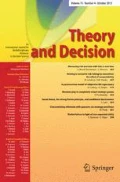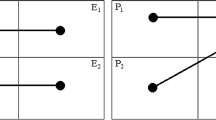Abstract
In this paper it is argued that certain stimulus-response learning models which are adequate to represent finite automata (acceptors) are not adequate to represent noninitial state input-output automata (transducers). This circumstance suggests the question whether or not the behavior of animals if satisfactorily modelled by automata is predictive. It is argued in partial answer that there are automata which can be explained in the sense that their transition and output functions can be described (roughly, Hempel-type covering law explanation) while their behaviors are in principle not predictable short of possession of their complete histories or of information concerning present internal states by indirect observation.
Similar content being viewed by others
Author information
Authors and Affiliations
Rights and permissions
About this article
Cite this article
Nelson, R.J. Behaviorism, finite automata, and stimulus response theory. Theor Decis 6, 249–267 (1975). https://doi.org/10.1007/BF00136197
Issue Date:
DOI: https://doi.org/10.1007/BF00136197




